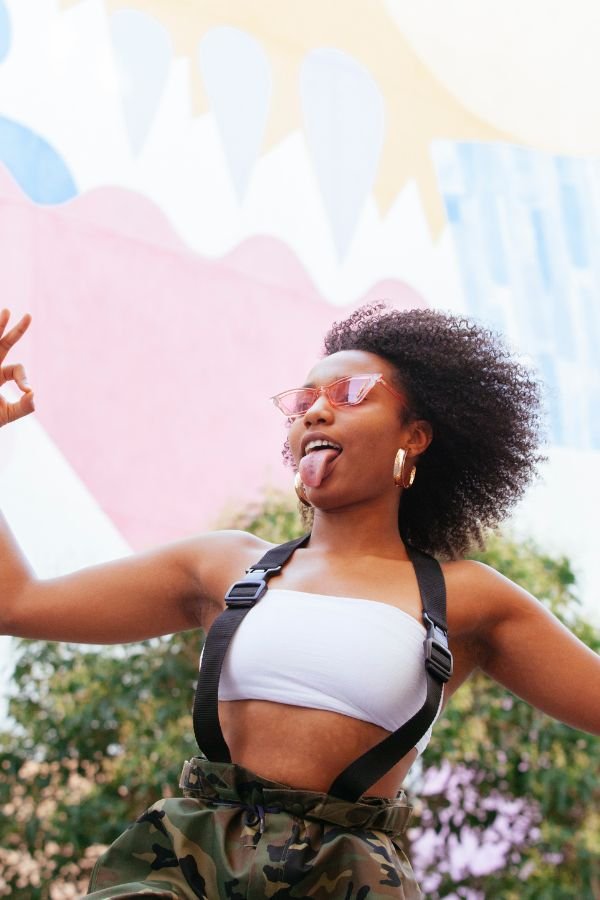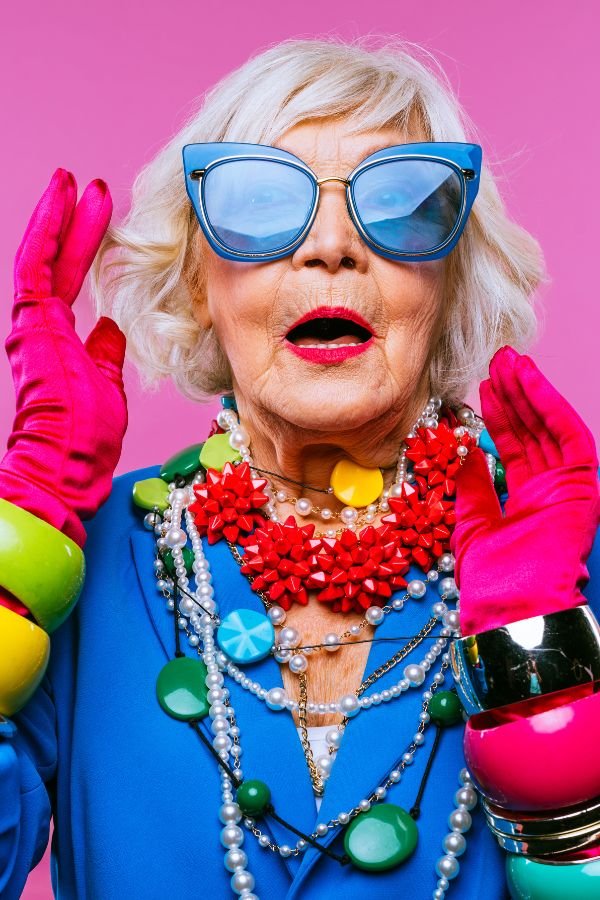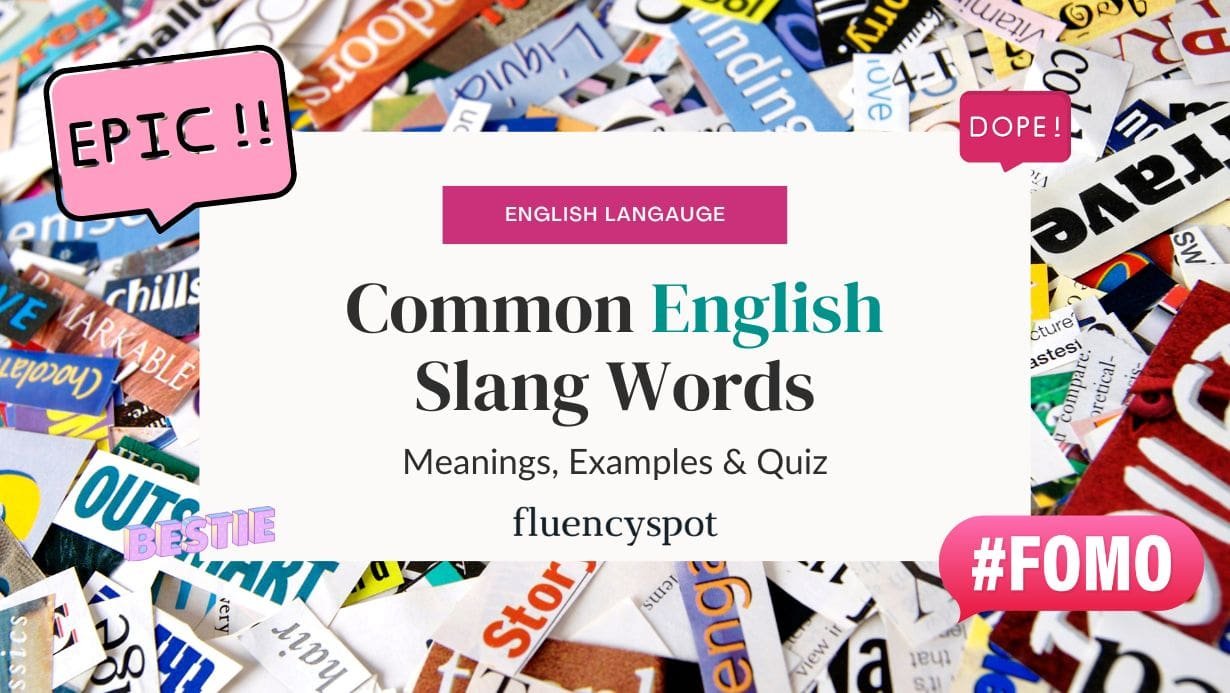Welcome to our exploration of common English slang words and their meanings. Slang, often defined as informal and non-standard language, has permeated our everyday conversations and digital communications, contributing to the colorful and ever-evolving nature of the English language.
In this article, we will delve into the origins and significance of slang, uncover the motivations behind its usage, and unravel a curated list of popular slang words used in contemporary English. From “lit” to “clapback,” we will dissect the meanings and contexts in which these words are employed. We will also examine the evolution of slang and its regional variations, providing insight into the cultural and geographical influences on language.
We will offer guidance on how to use slang words appropriately, ensuring that you are equipped to navigate the diverse linguistic landscape. So, let’s embark on this linguistic journey and unravel the fascinating world of common English slang words.

What Is Slang?
Slang refers to a collection of informal words and phrases that are commonly used in spoken language, often reflecting the current trends and culture of a particular society or social group.
These expressions may evolve from specific communities, professions, or subcultures, and are often used to create a sense of belonging and camaraderie among the members.
English Slang Words feature prominently in contemporary culture, illustrating the dynamic nature of language itself. It is intriguing to note how certain words and meanings gain popularity among different age groups and demographics, contributing to the cultural significance and diversity of urban language. Slang meanings can transform rapidly, reflecting the ever-changing societal narratives and cutting-edge influencers. Hence, keeping an eye on the latest developments in the Urban Slang Dictionary becomes essential for understanding the evolving language trends.
Why Do People Use Slang Words?
The use of slang words is driven by the desire to express individuality, create a sense of belonging, and communicate with familiarity and authenticity within specific social circles or communities.
Popular Slang Phrases enable individuals to convey their thoughts and emotions in a manner that resonates deeply with those who share similar experiences and cultural references. By embracing English Slang, individuals can establish connections, foster a sense of camaraderie, and strengthen social bonds through shared understanding and relatability.
Understanding Slang Expressions goes beyond mere language; it signifies being part of a collective identity, where the use of certain phrases or words becomes a form of shorthand communication, solidifying relationships and underlining a shared emotional landscape.
What Are Some Common Slang Words Used in English?
English language is rich with a wide array of common slang words that are prevalent in everyday conversations, reflecting the diverse cultural influences and linguistic evolution.
For instance, the American Slang Terms like ‘cool’, ‘awesome’, and ‘dude’ have become integral parts of global vernacular, while British slang, such as ‘cheers’, ‘bloke’, and ‘mate’, is widely embraced.
These youth slang words often reflect the contemporary culture and are frequently used in social media platforms, music lyrics, and daily interactions among the younger generation, establishing a unique linguistic identity.
Understanding and using everyday slang words has become essential for effective communication in modern society.
Lit
The slang word ‘lit‘ has become increasingly popular, often used to describe something that is exciting, amazing, or extremely enjoyable.
‘Lit’ is often utilized to express enthusiasm or excitement about an event, party, or experience. It can also be used to describe something as ‘cool’ or ‘awesome.’
For example, you might hear someone say, ‘That concert was absolutely lit,’ meaning it was thrilling or fantastic. Additionally, ‘lit’ is commonly used in the context of music, with people referring to a song, album, or performance as ‘lit’ to convey their enthusiasm for it.
Bae
The term ‘bae‘ is a popular slang word used to affectionately refer to a romantic partner or significant other, reflecting modern endearment and closeness.
Originally an acronym for ‘Before Anyone Else’, the slang term ‘bae’ has evolved to embody a sense of deep emotional connection and commitment in modern romantic relationships. Its usage conveys a sense of endearment and closeness, often employed to express strong affection and devotion to a loved one. This term has become a staple in contemporary conversations, reflecting the evolving lexicon of modern slang terms.
Savage
‘Savage’ is a slang term commonly used to describe someone or something as brutally honest, fearless, or unapologetically audacious, often found in the modern Urban Slang Dictionary and popular Slang Vocabulary.
In contemporary language, ‘savage’ has evolved beyond its original meaning of fierce or wild to connote a bold and daring attitude towards life. It embodies the spirit of fearlessness and unapologetic honesty, often associated with individuals who fearlessly express their opinions without holding back. This term is frequently used to commend someone’s boldness or to describe an action that defies social norms, celebrating audacious behavior that breaks barriers and pushes boundaries.
FOMO
The abbreviation ‘FOMO’ stands for ‘fear of missing out’, a commonly used slang term reflecting the anxiety or apprehension of being excluded from a social event or experience, prevalent in Common Slang Usage and Informal English Phrases.
This term has become pervasive in modern digital communication and social dynamics, manifesting as a form of social pressure and heightened comparison. The ‘FOMO’ phenomenon is often associated with the pervasive influence of social media, where individuals constantly witness curated highlights of others’ lives, leading to feelings of inadequacy or the fear of not participating in the same activities.
Additionally, ‘FOMO’ can influence decision-making, as individuals may prioritize attending events or experiences solely to avoid the anxiety of missing out, rather than based on genuine interest or necessity.
Ghosting
The slang term ‘ghosting‘ refers to the act of abruptly ceasing all communication and contact with someone, particularly in the context of personal relationships or social interactions, prevalent in both English Street Slang and Trending Slang Words.
This behavior is often carried out without any explanation or warning, leaving the person being ghosted with feelings of confusion, rejection, and hurt. The term ‘ghosting’ has gained significant traction in modern communication due to the prevalence of digital and online interactions, where it is easy for individuals to simply disappear from someone’s life without a trace.
With the rise of dating apps and social media, ghosting has become a common experience, with many people sharing their ghosting stories and seeking advice on how to cope with it.
Thirsty
The term ‘thirsty‘ is used as slang to describe someone’s eagerness, desperation, or excessive interest, particularly in the context of seeking attention or validation, making it relevant for both Slang in English Language and Slang for Language Learners.
When used in social contexts, ‘thirsty’ can convey an intense desire for social recognition, often portrayed as overbearing. For language learners, understanding slang like ‘thirsty’ adds a layer of fluency. Being able to discern nuances and context-specific meanings of slang is crucial for effective communication.
In language learning, exposure to slang terms like ‘thirsty’ can enhance comprehension of colloquial speech and idiomatic expressions. It also demonstrates how language evolves to reflect trends and attitudes within a culture, providing valuable insight into societal dynamics.
Salty
In contemporary slang, the term ‘salty’ is often used to describe someone who is bitter, resentful, or agitated, reflecting its prevalence as one of the recognizable American Slang Terms and its standing within Contemporary English Slang.
Its interpretation delves into the cultural nuances of expressing dissatisfaction or grumpiness, often associated with feelings of jealousy or frustration. The term carries an air of modern vernacular, resonating with the ways in which individuals articulate their emotions and reactions within social interactions.
The term ‘salty’ has gained relevance in online discourse, commonly appearing in comments and memes to characterize a person’s response as overly irritable or defensive. This demonstrates its integration into contemporary digital communication, extending its reach beyond spoken language.
Extra
The slang term ‘extra‘ is often used to characterize someone or something as overly dramatic, excessive, or attention-seeking, reflecting its usage in both Popular Slang Phrases and Trending Slang Words.
Its prevalence in contemporary language showcases its versatility, as it can describe a variety of behaviors, attitudes, and appearances. Whether it’s referring to someone who constantly seeks validation on social media or a situation that is unnecessarily over the top, ‘extra’ has become a go-to term for the younger generation.
The term has transcended its original context in youth culture and has been adopted in more formal settings, adding a touch of informality and relatability to everyday conversations. Its widespread acceptance in diverse social contexts speaks to the evolving nature of language and the impact of social media on linguistic trends.
Basic
The slang term ‘basic’ is often used to describe someone or something as unoriginal, mainstream, or lacking individuality, making it a notable entry in the English Slang Guide and Slang Vocabulary.
When referring to a person as ‘basic,’ it generally denotes a lack of unique taste or style, often associated with following popular trends without adding personal flair. In contemporary culture, it has become an umbrella term for anything considered predictable or unremarkable, from fashion choices to social media posts. The term is frequently used in casual conversation, memes, and online content, showcasing its widespread acceptance in modern vernacular.
Clapback
‘Clapback’ is a slang term used to describe a sharp, witty, or assertive response to criticism or insults, often embedded in Informal English Phrases and Slang Expressions.
This term has roots in African American Vernacular English and gained popularity in contemporary culture, particularly on social media platforms. A clapback is not simply a response; it carries a tone of give the power toment and confidence, allowing the recipient to reclaim power and dignity in the face of negativity. It has become an essential tool for asserting one’s presence and shutting down disrespectful comments or actions with style and eloquence.
Flex
The slang term ‘flex’ is commonly used to signify the act of showing off or boasting, reflecting its usage in Common Slang Usage and its recognition as one of the American Slang Terms.
When someone ‘flexes,’ they often seek to impress others by showcasing their achievements, possessions, or abilities. It’s a way for individuals to assert their status or validate their worth within social circles. The concept of ‘flexing’ is deeply rooted in the desire for validation and recognition, often tied to societal expectations of success and achievement. In essence, ‘flexing’ represents a form of self-promotion, where individuals strive to elevate their image or reputation through displays of prosperity or prowess. The term has evolved beyond material possessions, also encompassing personal attributes, such as physical fitness or intellect.
Mood
In contemporary slang, the term ‘mood’ is often used to express strong agreement, resonance, or empathy with a particular situation or sentiment, showcasing its relevance in both Trending Slang Words and Slang in English Language.
Its versatile usage has made it a popular choice for expressing emotions, opinions, or reactions in informal conversations, online interactions, and social media posts.
The word ‘mood’ has emerged as a cultural phenomenon, reflecting the ability to encapsulate a wide range of emotions and experiences in just a single word, resonating with diverse audiences.
From humorous memes to heartfelt expressions, the term ‘mood’ has become deeply embedded in modern communication, adding depth and nuance to everyday interactions.

How Do Slang Words Evolve?
The evolution of slang words is influenced by cultural shifts, technological advancements, and the dynamic nature of language, leading to continual adaptations and innovations within the realm of Contemporary English Slang and Slang Vocabulary.
These changes are crucial in shaping the meaning and usage of slang words in different contexts. Cultural shifts often bring about new expressions and references, reflecting the evolving societal norms and attitudes. Technological advancements play a significant role by introducing new concepts and terms that quickly become integrated into informal language usage. The dynamic nature of language ensures that slang continuously evolves to reflect contemporary issues, popular culture, and interpersonal interactions, contributing to the vibrancy and richness of English Slang Words.
What Are Some Examples of Regional Slang Words?
Regional slang words exhibit diverse linguistic expressions, with examples ranging from Irish slang influenced by Gaelic terms to American Slang Terms that derive from various cultural and ethnic influences.
Irish slang often incorporates Gaelic terms that have been passed down through generations, reflecting the rich cultural heritage of Ireland. For example, the word ‘craic’ comes from the Gaelic ‘craic’ meaning ‘fun’ or ‘good times.’
On the other hand, American Slang Terms are heavily influenced by diverse linguistic and cultural roots, such as the incorporation of Spanish words like ‘gringo’ or African American Vernacular English expressions like ‘cool’ and ‘chill.’
Y’all (Southern United States)
The term ‘y’all‘ is a distinct feature of the Southern United States’ regional dialect, serving as a colloquial contraction for ‘you all’ and embodying its recognition within American Slang Terms.
Embracing a sense of warmth and familiarity, ‘y’all’ is deeply entwined with the culture and linguistic identity of the Southern states. Used as a second-person plural pronoun, it reflects the region’s emphasis on hospitality and inclusivity, embodying a reflection of social cohesion and communal connection. Its usage extends beyond linguistic boundaries, symbolizing Southern pride and heritage. The term has gained recognition in popular culture, representing more than just a dialect feature but a marker of regional identity and solidarity.
Wicked (New England, United States)
In the New England region of the United States, the slang term ‘wicked‘ is commonly utilized to emphasize something as extremely impressive, cool, or remarkable, reflecting its presence in English Slang Words and its status as one of the Trending Slang Words.
Moreover, ‘wicked’ has deep cultural roots in the region, often attributed to the influence of early English settlers and the subsequent evolution of language within the community. This term has become ingrained in daily conversations, serving as a unique identifier of New England’s vernacular.
Strikingly, the word has also transcended regional boundaries, gaining recognition and usage in popular media, music, and entertainment, thereby solidifying its position as a prominent element of contemporary English language variations.
Bloody (British and Australian English)
The term ‘bloody’ is a prominent element of British and Australian English, commonly used as an intensifier or expletive, reflecting its prevalence in expressing emotions and its inclusion in the British Slang Explained category.
In British slang, ‘bloody’ is often employed to add emphasis or express frustration, giving the language a distinctive and colorful flair. Its versatility allows it to convey a wide range of emotions, from annoyance to astonishment, making it an essential part of everyday communication. This word carries historical connotations as well, dating back to 18th-century England, enhancing its cultural significance.
Australians also embrace ‘bloody’ with equal enthusiasm, infusing their speech with the same fervor and spirit.
[thrive_leads id=’3945′]
How Can You Use Slang Words Appropriately?
Using slang words appropriately involves understanding their context, audience, and cultural implications, necessitating a nuanced approach that aligns with the accepted norms and practices within Common Slang Usage, Slang Vocabulary, and the English Slang Guide.
Whether it’s street talk, idiomatic expressions, or colloquial phrases, the Common Slang Usage, Slang Vocabulary, and the English Slang Guide offer a palette of linguistic color that reflects the vibrant tapestry of modern language.
One needs to be mindful of the appropriateness of employing slang in different settings, recognizing the fine balance between being expressive and respectful.

Here are some of the top 50 common English slang words and their meanings:
- What’s up? – Hey; what are you doing?
- Same here – I agree.
- Chill – Relax.
- The boys – Police
- The feds – Any law enforcement
- Airhead – Silly/foolish person.
- Clap back – Verbal retaliation to criticism.
- Flex – Feeling fabulous about yourself.
- Drip – Refers to one’s impressive and fashionable appearance or style.
- Cheugy – Anything that’s considered uncool, untrendy, or people who deliberately stick to “older” trends.
- Glizzy – Hot dog.
- OK boomer – A dismissive retort to someone older or out of touch.
- Ghosted – Ignored or disappeared without explanation.
- High key – Openly or obviously.
- Sus – Suspicious or shady.
- Lit – Amazing or exciting.
- Salty – Bitter or angry.
- Tea – Gossip or information.
- Shook – Surprised or shocked.
- Vibe – Feeling or atmosphere.
- Bae – Term of endearment for a significant other.
- Ratchet – Low quality or trashy.
- Woke – Aware of social issues.
- Hype – Excitement or anticipation.
- On fleek – Perfect or flawless.
- Faded – Inebriated, intoxicated.
- Fire – Great quality.
- FOMO – Fear of missing out.
- GOAT – Greatest of all time.
- Mid – Mediocre.
- Thot – A promiscuous woman
- Thirsty – Desperate or eager.
- TMI – Too much information.
- YOLO – You only live once.
- Squad – Group of friends.
- Savage – Ruthless or fierce.
- Basic – Unoriginal or boring.
- Gucci – Good or cool.
- No cap – No lie or truth.
- Clout – Influence or fame.
- Extra – Over the top or excessive.
- Lowkey – Secretly or subtly.
- Noob – Inexperienced or new.
- Ship – Support or endorse a romantic relationship.
- Stan – Overzealous fan.
- Throw shade – Insult or criticize.
- Wavy – Cool or impressive.
- Yeet – Expression of excitement or victory.
- Thicc – Attractive or curvy.
- Vibing – Enjoying or feeling good.
50 Common English Slang Quiz:
Frequently Asked Questions
What are common English slang words and their meanings?
Some common English slang words and their meanings include: “Ghosting” (ceasing communication without explanation), “Lit” (amazing or exciting), “Salty” (bitter or upset), “Savage” (brutally honest or impressive), “GOAT” (Greatest Of All Time), “Low-key” (desiring something quietly), “High-key” (desiring something openly), “Flex” (to show off), “Throw shade” (to subtly insult), “Woke” (aware of social justice issues), “FOMO” (Fear Of Missing Out), “Gucci” (good or going well), “Basic” (lacking originality), “Tea” (gossip), “Squad” (close group of friends), “Extra” (over the top), “TBH” (To Be Honest), “Snack” (extremely attractive person), “Vibe” (mood or atmosphere), “No cap” (truthfully speaking), and “Clapback” (a witty response).
What does “lit” mean in slang?
“Lit” is a slang term used to describe something that is exciting, fun, or enjoyable. It can also mean something that is extremely good or impressive.
What is the meaning of “FOMO”?
“FOMO” is an acronym for “fear of missing out”. It is used in slang to describe the feeling of anxiety or unease that one experiences when they are not included in an exciting event or activity.
What does “on fleek” mean?
“On fleek” is a slang term used to describe something that is perfect, flawless, or on point. It is often used to describe someone’s appearance or style.
What is the definition of “woke” in slang?
“Woke” is a slang term that means being aware of social and political issues, especially those related to discrimination and inequality. It can also refer to someone who is knowledgeable and well-informed.



